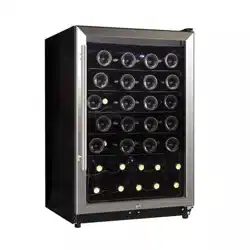Loading ...
Loading ...
Loading ...

Maintenance Service and Troubleshooting
2. Too much refrigerant charged into the system
Analysis of Problem
a. If the amount of refrigerant charged into the system exceeds its capacity,
the surplus refrigerant will take space in the evaporator, which will reduce
its heat-dissipation area and the refrigerating efficiency. Malfunctions
caused by this abnormal occurrence are:
i. the gas suction and exhaust pressures are higher than normal,
ii. the condenser is hot,
iii. the compressor’s electric current rises,
iv. loose frost forms on the evaporator,
v. the refrigerator temperature drops slowly, and
vi. frost appears on the gas return tube.
b. If excessive refrigerant has been charged, the liquid refrigerant that
cannot evaporate in the evaporator will return to the compressor, causing
"liquid striking." The refrigerant evaporates and bubbles as soon as it
flows into the refrigerating oil at the bottom of compressor. In severe
cases, foam will cover the inside of the compressor and be pulled in by
the piston, causing damage to the components of the compressor.
Solution
According to operating procedures, it is necessary to turn the appliance off.
After a few minutes, open the refrigerant charging tube, let refrigerant escape,
replace dry filter, recharge refrigerant after evacuating, and seal charging port.
3. Air left in the refrigerating system
Analysis of Problem
Residual air in the refrigerating system will reduce its refrigerating efficiency.
The main effects are a higher temperature in the segment from the compressor
outlet to the condenser inlet and an increase in the gas suction and exhaust
pressures, although the gas exhaust pressure will not exceed its rated value.
Since there is air in the system, both the gas exhaust pressure and temperature
will rise, and the gas-flowing sound is intermittent and louder.
Solution
Turn off the refrigerator for several minutes, then open the tubing, evacuate it,
and recharge the system with refrigerant.
4. Low efficiency of compressor
Analysis of Problem
Low efficiency of a refrigerating compressor refers to the reduction of gas
discharge capacity and the corresponding reduction of refrigerating capacity
due to the fact that the refrigerant in the system is unchanged. This normally
occurs when the compressor has been in use for a long period of time: its
moving parts have worn out, clearance fits have increased, and the sealing
property of its gas valve has deteriorated, causing a decrease in its gas
discharge capacity.
18
Loading ...
Loading ...
Loading ...
